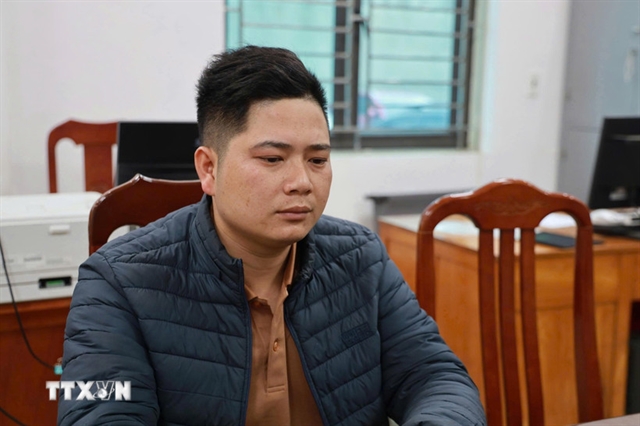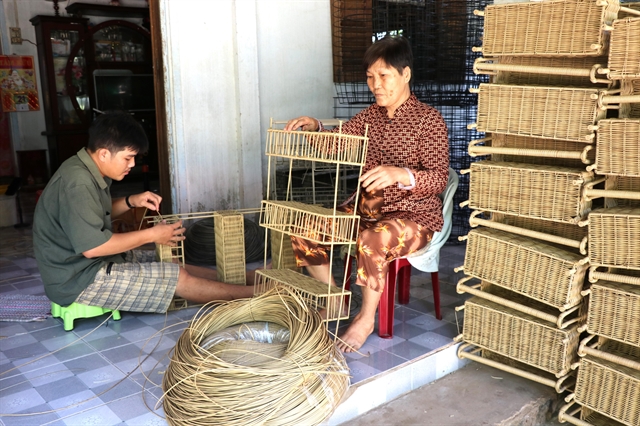 Economy
Economy
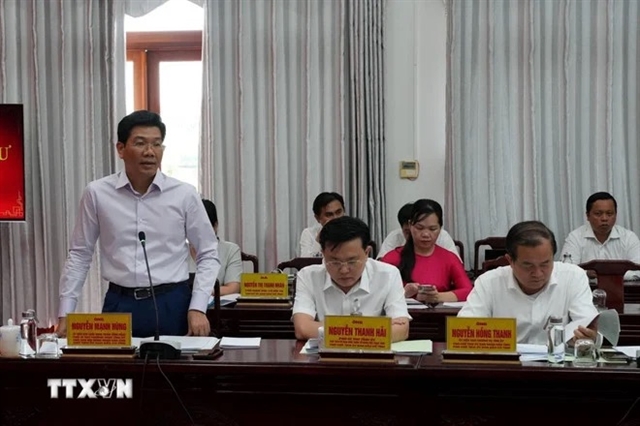
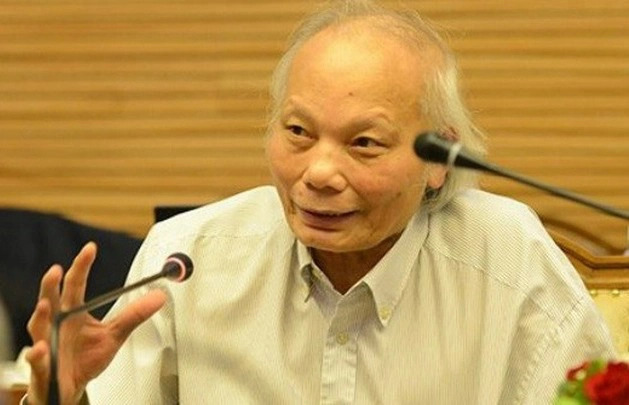 |
| Chairman of the Vietnam Association of Foreign Investment Enterprises (VAFIE) Nguyễn Mại. Photo nhadautu.vn |
The global minimum corporate income tax, initiated by the Organisation for Economic Cooperation and Development (OECD), means enterprises with annual revenues of 750 million euros or more are eligible for a tax rate of 15 per cent, with many countries applying this rate from 2024.
Chairman of the Vietnam Association of Foreign Investment Enterprises (VAFIE) Nguyễn Mại speaks with Nhà Đầu Tư (The Investors) online newspaper on why Việt Nam must implement this rate soon to remain an attractive FDI destination.
Last August, the Prime Minister established a special working group to study the global minimum corporate tax rate. There’s no information about when Việt Nam will apply this new tax rule, though many other countries announced they would start applying it next year. What’s your opinion about the issue?
According to the OECD, some countries are applying corporate income tax of 27-28 per cent, and Việt Nam at 20 per cent.
We are not restricting FDI enterprises. We encourage them to grow, but the domestic businesses must develop at a higher rate to achieve our goal, which is to build an independent and self-reliant economy associated with extensive and effective international integration.
Việt Nam has policies to create a favourable investment environment, which investors highly appreciate. It is necessary to choose methods that both ensure the interests of Việt Nam and its investors.
In Việt Nam, this tax rule is new and has many different approaches. For example, the Ministry of Planning and Investment always tries to encourage FDI in our country. At the same time, the Ministry of Finance wants to ensure that the global minimum tax mechanism does not damage the country’s budget. Experts also have different opinions about the issue.
In 2022, the Government began to study this new tax rule. In June, the VAFIE held the first workshop and submitted to the Prime Minister solutions to implement the global minimum tax. A working group, including investment experts, economic experts, financial experts, tax experts, and Big 4 accounting firms, was set up to consult the Government.
We are doing it carefully. This involves large investors, and the Government wants to consult their opinions and the opinions of countries/territories investing in Việt Nam, such as the Republic of Korea, the US, Japan, Singapore, and Taiwan.
If the Government can submit to the National Assembly to amend relevant laws such as the Law on Enterprises, the Law on Investment, and the Law on Tax Administration this October, the new tax rule will be applied in 2024. The National Assembly can issue a resolution for the Government to issue sub-law regulations in case we can’t do it by 2024.
Most FDI enterprises want the new tax rule to apply simultaneously in their country and Việt Nam. For example, a South Korean corporation is paying corporate income tax of 7 per cent in Việt Nam. They will have to pay at least an 8 per cent tax difference for South Korea if Việt Nam doesn’t apply the new rule. What are your comments on this?
Slow implementation of the global minimum tax can lead to two disadvantages. Firstly, Việt Nam does not get the 8 per cent tax difference. More than 100 FDI businesses have to pay this tax in Việt Nam. This means our budget will lose several billion USD annually. The total annual budget revenue is only about $100 billion.
Secondly, the investment environment will be affected. Investors will redirect their investment to other countries with a benefit-sharing mechanism related to this new tax rule. Any country implementing a global minimum tax must negotiate with FDI corporations to implement a benefit-sharing mechanism.
The OECD has recommended several support mechanisms for businesses when applying the new tax. Is there any mechanism that suits Việt Nam?
We need experience from many countries. For example, Indonesia has a mechanism to encourage green and circular projects. The government sells carbon quotas to countries or businesses with excessive greenhouse gas emissions.
In today's global environment, many initiatives can be applied. Suppose the parties refer to the international experience, not only from Europe but also from countries in the region such as Indonesia, Malaysia or Thailand. In that case, our mechanism will surely receive the most response from investors.
I think many countries' policies, including ours, have paid too much attention to tax incentives. Taxes are necessary but not always the most important.
We used to offer a business a financial incentive of $80 million, equivalent to 8 per cent of their total investment in Việt Nam, but by supporting human resource training instead of in cash.
I was in a special task force under former Prime Minister Phan Văn Khải and Deputy Prime Minister Phạm Gia Khiêm. We agreed to provide 3,200 engineers that meet the qualification requirements of that business. Universities were directed to provide training according to the business requirements.
As far as I know, that business will invest more than $4 billion in HCM City this year. That enterprise does not worry about human resources anymore because they’ve already had training centres.
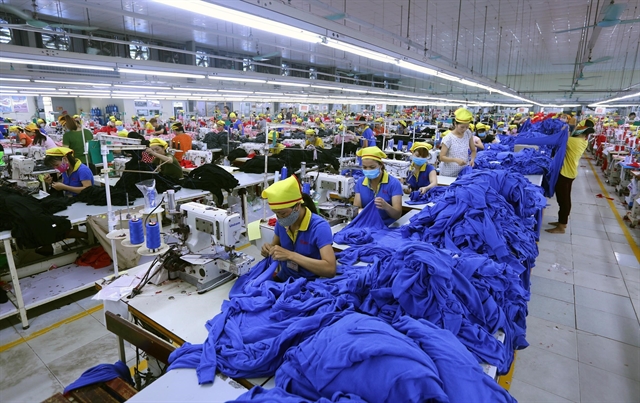 |
| Workers at the garment production line at Hana Kovi Việt Nam, a South Korean-invested garment company in Bắc Giang Province. VNA/VNS Photo Danh Lam |
What should business associations do to make the global minimum tax put into effect soon in Việt Nam?
All associations greatly appreciate the Government's efforts to perfect institutions and reform administrative procedures. The Prime Minister, ministers, and leaders of the provinces and cities are always ready to receive investors. Therefore, they are not worried about joining the Government to solve the new tax.
Among 100 Japanese investors, 65 said they were ready to expand production in Việt Nam. AmCham's survey shows that investors only move within Việt Nam's territory if they move production. Very few want to move to other countries. Apart from India and Indonesia, they think Việt Nam is a good place to receive investment from China. We have received more investors of this type.
I know large corporations have set up a working group on the issue. I suggest businesses should contribute to the law-making process. Once the National Assembly passes the law, it isn't easy to amend it. Businesses should participate so that the Government have diverse opinions.
The global minimum tax is a huge challenge but also brings new opportunities for Việt Nam. Could you clarify it?
We call it a new challenge because we have been unable to handle tax evasion and transfer pricing. The OECD says about $220 billion in taxes will go back to the recipient countries. There was a time when Việt Nam ranked 18th in the world regarding receiving investment. I believe the rank will be higher this year because we have big projects from the US and Europe in renewable energy, digital technology, and liquid natural gas.
If there is a mechanism for this tax, we can rest assured that we will not lose what we did not receive. If there is a good tax mechanism based on learning from other countries, plus the advantages of Việt Nam, such as political and economic stability, good inflation control, and a market of 100 million people with 25-30 million people in the middle class, it is a great opportunity. We have a very good world market thanks to 15 signed free trade agreements and those being negotiated and signed. All factors that belong to Việt Nam's advantage will be multiplied.
The Politburo’s Resolution 50 decided to attract investment capital and improve the quality and efficiency of investment capital by attracting many multinational companies in the Top 500 to implement projects of high technology, future technology, modern services, research and development, human resource training, and human health care.
What is your opinion about the investment trend in Việt Nam when the new tax is applied, possibly in 2024 or 2025?
I am very optimistic because many renewable energy and green growth projects exist. Future technology projects such as AI and Big Data are in the negotiation process. I believe there will be a new wave of FDI in Việt Nam.
What I'm most worried about is not that we can’t attract big investors but our shortcomings in administrative procedures and corruption.
Moreover, law enforcement is not strict. Last year, the Ministry of Justice inspected and forced provincial and municipal government agencies to remove hundreds of regulations, including excessive investment incentives, too low land rents, or regulations not required by law.
Another problem is that we have a lot of big investors, but we don't know which investors suit our projects. What they offer isn’t always what we need.
Multinational companies always have a global investment strategy and normally change it every 5-7 years. However, in times of crisis, they will probably change anytime. The investment promotion agencies have not managed to access these changes.
We held seminars that took time and money but brought no benefit. If we do not fundamentally reform from investment promotion to administrative procedures to assist investors, we will lose great opportunities.
Currently, we have a very fast-growing private economy. There are many large corporations and many small and medium companies. We need to pay attention to FDI enterprises in promoting them to help both the country and domestic enterprises develop. – VNS

